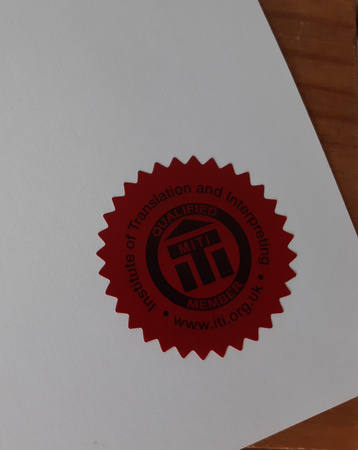Certified Translations - Certainly Simple!
Business for certified translations continues during lockdown as official paperwork never rests!

If you’re asked for a certified, official or ‘attested’ translation of your documents, how can you tell who needs to stamp what and when?
First, get the following important information that your language service provider needs to guide you through the process:
- In which country will your documents be used?
- Does the translator certifying need to be registered in a particular region?
- Precisely which ‘level’ of certification is required, i.e. certified / sworn*, notarised or legalised translation? Double check this with the end user.
So what exactly is a certified translation?
- Certified translations must be provided by translators or language service providers who are appropriately registered with the relevant body. In the UK, a common law country, these translators are Qualified Members of the Institute of Translation and Interpreting. In civil law countries such as Spain, *‘sworn’ translators are instead qualified translators appointed by the government.
- The translator keeps a record of the translation, binds the original text and the translation together and affixes seals together with a set declaration that includes their contact details and signature. To remain valid, the bound pages of the original and translation must be kept intact, as prepared by the translator.
- Asking a solicitor to ‘certify’ a translation (i.e. check the identity of the translator) is not the same thing as obtaining a certified, notarised or legalised translation and, in our experience, is usually not what is required for official translations.
Certification - examples
? Do you need translations of academic certificates and transcripts for entry onto a higher education programme?
? Do you need to submit personal or legal documents from one country to government bodies in a second country, e.g. court orders, marriage certificates, tax or company documents?
Certified translation is normally sufficient. If the original document bears an Apostille, this must also be included in the translation.
Notarisation or legalisation
For export documentation, for example, translations may need further levels of approval, i.e. the certified translation may need to be notarised. In the UK, this means that a Notary Public will identify and take proof of identity of the translator, prepare an affidavit of due translation of the original document and enter a record of the documents in his/her protocol. The translated documents may then go on to be legalised by the FCO, followed by the Embassy or High Commission of the country where the documents will be used.
It’s like a little hierarchy of stamps.
Further information on certified translations is available from the Institute of Translation and Interpreting at: https://www.iti.org.uk/language-services/official-translations
Follow DeScribe Language Services on
